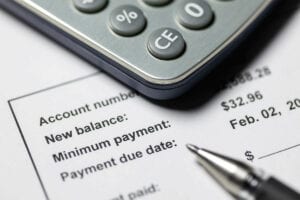When you owe money to your bank or credit union, through a credit card or loan for example, they can legally take money owed to them out of your accounts if you fail to make payments. The term used for this is the right of set-off. If it happens to you, it can be a rude awakening that forces you to confront financial difficulties. Unfortunately, it can also worsen your financial problems.
Canadian law has three kinds of set-offs: contractual, legal, and equitable. The basis of legal set-off is statute law. While the basis for equitable set-off is the less stringent law of equity.
Here, we’ll go over the basics of set-off, like the different kinds and how it applies to you.
What is a right of set-off?
The most important form of a right of set-off (aka, right of offset) to know about when it comes to personal finances is between a bank and its account holders. A right to set-off lets a bank reclaim money owed to them by an account holder. Banks often add a clause in their account contracts that grant them this power. Third-party lenders and collection agencies cannot access your bank account in the same way.
How does a right to set off work?
When a bank uses its right of offset, it can use the money you have with it, or its affiliates, to cover any debt you owe.
It can do so without:
- letting you know first
- asking your permission
- leaving you any money if what you owe is greater or equal to the amount in your account
For example, your bank may charge you an NSF (non-sufficient funds) fee even if occurs because they’ve taken money out of your account that you had planned to be available for another bill. These fees, of course, add to any financial issues and can quickly lead to a rise in debt.
It’s important to note that a right of offset may also apply to joint accounts.
If you have any questions about your bank’s right of offset, all the details should be outlined in your account agreement or you can contact your bank.
Example of a right of offset clause
Different financial institutions have their own way of expressing the right of offset in their agreements. Here is an example of an account agreement. Look for a clause with similar wording.
“We may debit any other account you have with us with the amount of any payment you are required to make to us and credit the amount to the outstanding debt under this agreement.”
What to do if you’re facing a right of set-off
A good first move once you realize a right of offset has been actioned against you is to look over the deposit agreement you signed when opening the account. Carefully examine anything details about the right to set-off. Make sure you understand your particular bank’s policies when it comes to exercising a right to set-off. Being informed may help when it comes to the next step.
Secondly, contact the bank. If, when reading your agreement, you’ve found that the action has been taken erroneously talk to them about it. If it was a legitimate action, find out about any potential further actions being taken and talk to them about setting up a payment plan that will fit your budget. This will hopefully, stop any more funds from being taken from your account. Most importantly, if they agree to a new plan, follow through!
How to prevent getting into a right of set-off
Here are some practical tips for avoiding a right of set-off being actioned against you:
Pay off your credit balance
Staying up to date with your payments to your lender will help you stay away from the right of offset clause in the agreement. Provided you keep up with your payments on time, it is unlikely that they will try to take any money from your account without your consent. This will also help you maintain good bank credit.
Negotiate payments
If you think you don’t have enough money for a third-party invoice payment, be proactive and talk to your bank quickly to explain the situation.
Avoid getting loans or credit cards from your bank
This right of offset is only applicable if the lender is the same bank where you have a bank account. If you don’t owe your bank money in the form of a loan or debt, then they cannot legally withdraw the funds from your account
Be mindful of those you bank with
If, possible, avoid sharing a bank account with someone who is indebted to the bank. If you have opened a joint bank account with someone who owes the bank money, the bank can take the money they are owed out of the joint account.
Types of set-offs
After the Supreme Court of Canada’s decision in the Holt v Telford case, three forms of set-off are recognized in Canadian law; contractual, legal, and equitable.
Contractual set-off
Contractual set-off allows the parties involved in a contractual agreement to cancel out their obligations. Apart from insolvency, the only requirement for a contract to be valid is that the parties must agree to its terms.
By entering a contract, the terms govern, and the usual rules applying to other forms of set-off do not apply.
Legal set-off
Legal set-off applies if both parties owe a fixed amount, and the same people have a role in each debt.
Equitable set-off
Often, it takes going to court or a Civil Resolution Tribunal to get a ruling for an equitable set-off. That’s because equitable set-offs usually arise out of a dispute between the two parties involved. For example, one side says they are owed money, but the other says they don’t owe anything because damages occurred out of conducting services offered to the other party. The cost of damages being as much, if not more, than what’s owed. Civil procedure may declare an equitable set-off in cases such as this, depending on the overall findings.
Conclusion
If the right to set-off has been actioned against you and you need help with debt repayment, contact us today. Our qualified Credit Counsellors are here to provide personalized help so you can pay off debt and move on with your life!




